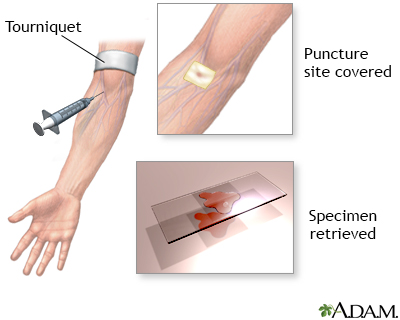Complete blood count - series

Indication
The complete blood count (CBC) is a screening test, used to diagnose and manage numerous diseases. It can reflect problems with fluid volume (such as dehydration) or loss of blood. It can show abnormalities in the production, life span, and destruction of blood cells. It can reflect acute or chronic infection, allergies, and problems with clotting.
The CBC test isolates and counts the 7 types of cells found in the blood: neutrophil, eosinophil, basophil, red blood cell, lymphocyte, monocyte, and platelet.

Procedure
A CBC requires a small blood specimen. Blood is drawn from a vein, usually from the inside of the elbow or the back of the hand.
Preparation: The skin should be cleaned with alcohol or iodine before the test. The patient should be seated comfortably or reclining.
How the test will feel:
When the needle is inserted to draw blood, some people feel moderate pain, while others feel only a prick or stinging sensation. After the blood is drawn, there may be some throbbing.
Although the CBC test is very safe, any blood drawing has a slight risk of complication, including:
- Oozing of blood from puncture site
- Fainting or feeling lightheaded
- Hematoma (blood accumulating under the skin)
- Multiple punctures to locate veins
- Infection (a slight risk any time the skin is broken)

Results, part 1
Results:
Normal values vary with altitude and sex.
What abnormal results may mean:
Low numbers of red blood cells may indicate anemia, which has many causes including:
- Blood loss
- Iron deficiency
- Deficiences of vitamin B12 or folic acid
- Bone marrow failure (for example, from radiation, toxin, fibrosis, tumor)
- Erythropoietin deficiency (secondary to kidney disease)
- Hemolysis (RBC destruction)
- Leukemia
- Multiple myeloma
- Over hydration
Low numbers of white blood cells (leukopenia) may indicate:
- Bone marrow failure (for example, due to granuloma (granular tumor), tumor, or fibrosis)
- Presence of cytotoxic substance
- Collagen-vascular diseases (such as lupus erythematosus)
- Disease of the liver or spleen
- Radiation exposure
High numbers of white blood cells (leukocytosis) may indicate:
- Infectious diseases
- Inflammatory disease (such as rheumatoid arthritis or allergy)
- Leukemia
- Severe emotional or physical stress
- Tissue damage (for example, burns)
A high hematocrit may indicate:
- Dehydration
- Burns
- Diarrhea
- Eclampsia
- Erythrocytosis
- Polycythemia vera
- Shock

Results, part 2
High numbers of red blood cells may indicate:
- Cigarette smoking
- Low oxygen tension in the blood
- Congenital heart disease
- Cor pulmonale
- Pulmonary fibrosis
- Polycythemia vera
- Dehydration (such as from severe diarrhea)
- Emphysema
BACK TO TOP
Review Date: 10/14/2024
Reviewed By: Warren Brenner, MD, Oncologist, Lynn Cancer Institute, Boca Raton, FL. Review provided by VeriMed Healthcare Network. Also reviewed by David C. Dugdale, MD, Medical Director, Brenda Conaway, Editorial Director, and the A.D.A.M. Editorial team.

Health Content Provider
06/01/2025
|
A.D.A.M., Inc. is accredited by URAC, for Health Content Provider (www.urac.org). URAC's accreditation program is an independent audit to verify that A.D.A.M. follows rigorous standards of quality and accountability. A.D.A.M. is among the first to achieve this important distinction for online health information and services. Learn more about A.D.A.M.'s editorial policy, editorial process and privacy policy. A.D.A.M. is also a founding member of Hi-Ethics. This site complied with the HONcode standard for trustworthy health information from 1995 to 2022, after which HON (Health On the Net, a not-for-profit organization that promoted transparent and reliable health information online) was discontinued. |
The information provided herein should not be used during any medical emergency or for the diagnosis or treatment of any medical condition. A licensed medical professional should be consulted for diagnosis and treatment of any and all medical conditions. Links to other sites are provided for information only -- they do not constitute endorsements of those other sites. © 1997- 2025 A.D.A.M., a business unit of Ebix, Inc. Any duplication or distribution of the information contained herein is strictly prohibited.
